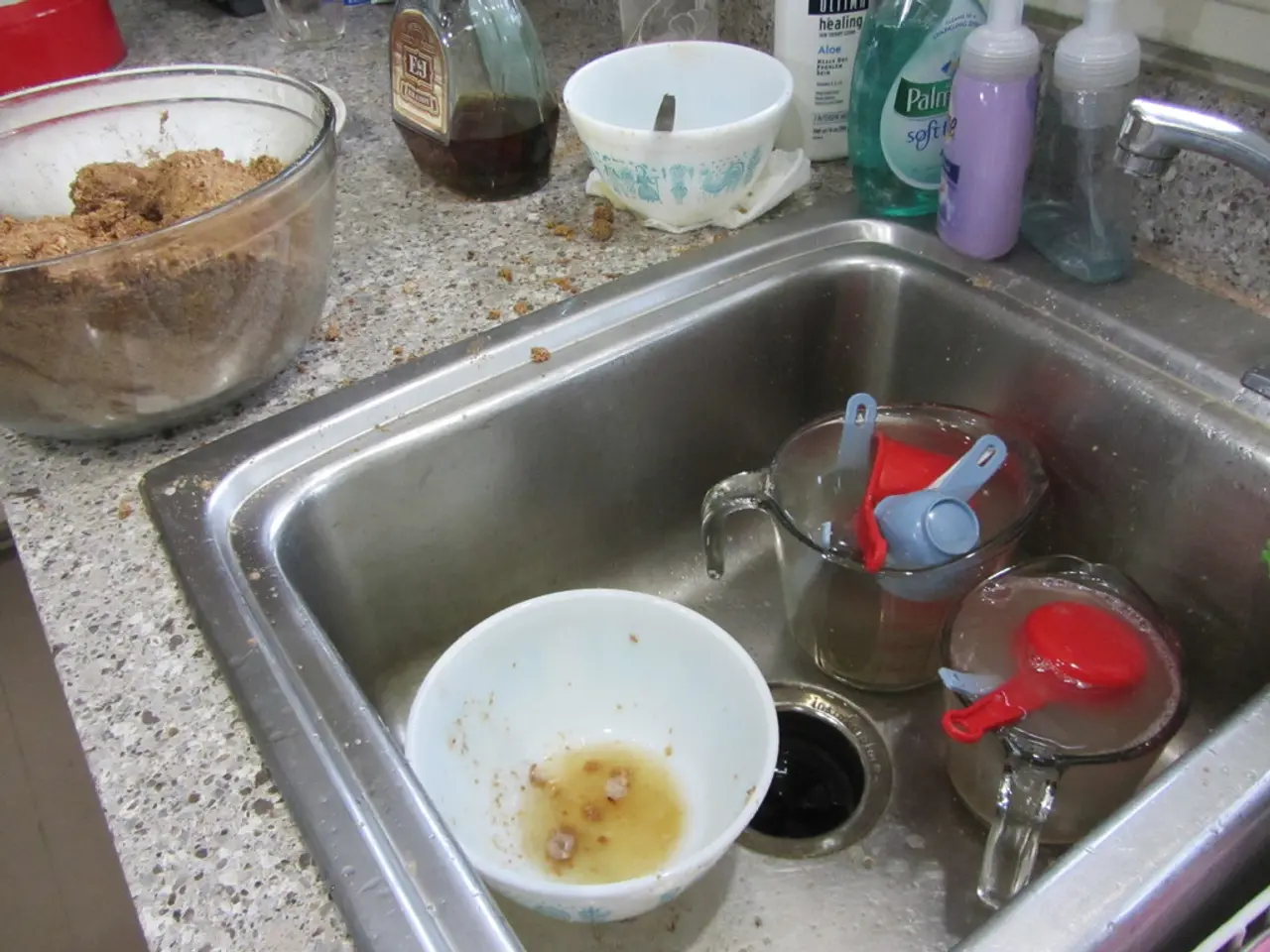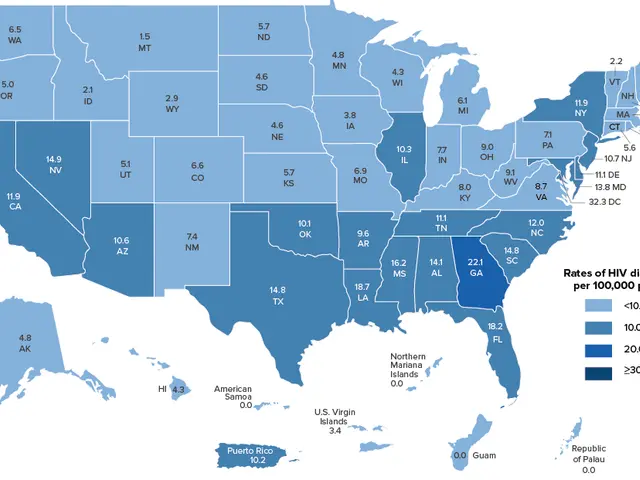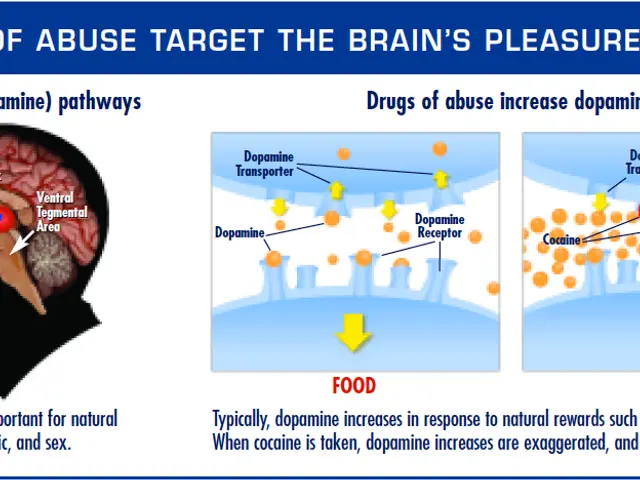Diet for C. difficile Infection: Edible Options and Restrictions, Meal Suggestions, and Strategies
For individuals battling a Clostridium difficile (C. diff) infection, maintaining a balanced diet can significantly help manage symptoms and aid in recovery. Here's a guide to recommended and avoidable foods during this period.
### Recommended Food Choices:
During active C. diff infection, low-fiber, low-fat, soft, and starchy foods are generally advised. These include peeled potatoes, noodles, refined grains like white rice and white bread, saltine crackers, bananas and applesauce, lower-fiber vegetables such as green beans, beets, and peeled zucchini, soups and broths, and fluids with electrolytes.
### Foods to Avoid:
High-fiber foods, such as whole grains, nuts, seeds, beans, and raw vegetables, should be limited due to their potential to increase stool volume, gas, and cramping. High-fat or greasy foods should also be avoided, as they can worsen digestive symptoms. High FODMAP foods might be considered for temporary restriction, as they can increase gas and discomfort.
### Additional Notes:
While fiber is generally beneficial for gut health in the long term, during an active C. diff infection, low fiber intake is suggested to ease symptoms. It's important to maintain hydration and electrolyte balance due to fluid loss from diarrhea. Once symptoms improve, gradually reintroducing fiber-rich and nutrient-dense foods may support microbiome diversity and recovery.
### Probiotics and Fermented Foods:
Probiotics and fermented foods may help restore a healthy gut microbiome and prevent recurrence by improving gut dysbiosis. However, specific clinical guidance should be followed. Some examples of probiotic-rich foods include fermented dairy foods, sauerkraut, fermented tempeh, miso, and kefir.
### Recipes:
Two recipes that can be beneficial during a C. diff infection are the probiotic breakfast bowl and the macrobiotic miso soup. The probiotic breakfast bowl recipe serves 4 and includes quinoa, avocado, scallions, olive oil, baby spinach, eggs, fermented red cabbage or beet kraut, plain Greek yogurt, and hemp seeds. The macrobiotic miso soup recipe requires wakame sea vegetable, root vegetables, leafy greens, miso paste, and scallions for garnishing.
It's important to note that C. diff bacteria can contaminate surfaces and materials for up to 5 months without proper decontamination and disinfection. Proper hygiene practices should be observed to prevent infection spread.
If a C. diff infection is diagnosed, treatment may involve stopping the antibiotics that caused the infection, additional antibiotics, surgery, or a fecal microbiota transplant. A fecal microbiota transplant involves transplanting healthy gut bacteria from a donor into the person with the infection. This can be done using a colonoscopy, sigmoidoscopy, or an enema.
In conclusion, a low-fiber, low-fat, soft food diet with adequate hydration and electrolyte replacement is recommended during a C. diff infection, while avoiding high-fiber, greasy, and gas-inducing foods until symptoms improve.
- An individual with Clostridium difficile (C. diff) infection should focus on low-fiber, low-fat, soft, and starchy foods for optimal digestive health.
- Peeled potatoes are beneficial due to their low-fiber content during this period.
- Noodles are a recommended food choice due to their soft texture.
- Refined grains like white rice and white bread can provide energy without exacerbating symptoms.
- Saltine crackers are a common food suggested for C. diff patients.
- Bananas and applesauce are often recommended due to their soft texture and low fiber content.
- Lower-fiber vegetables such as green beans, beets, and peeled zucchini can be included in the diet.
- Soups and broths are nutritious options for maintaining hydration and electrolyte balance.
- Fluids with electrolytes are essential for staying hydrated during C. diff infection.
- High-fiber foods like whole grains, nuts, seeds, beans, and raw vegetables should be limited due to their potential to worsen symptoms.
- High-fat or greasy foods should also be avoided to minimize digestive discomfort.
- High FODMAP foods might be temporarily restricted to reduce gas and discomfort.
- Maintaining hydration and electrolyte balance is crucial due to fluid loss from diarrhea.
- Once C. diff symptoms improve, gradually reintroducing fiber-rich and nutrient-dense foods can support microbiome diversity and recovery.
- Probiotics and fermented foods can help restore a healthy gut microbiome and prevent recurrence.
- Fermented dairy foods, sauerkraut, fermented tempeh, miso, and kefir are examples of probiotic-rich foods.
- A probiotic breakfast bowl recipe with quinoa, avocado, eggs, and fermented red cabbage can be beneficial.
- The macrobiotic miso soup recipe containing wakame sea vegetable, root vegetables, leafy greens, and miso paste is another valuable option.
- C. diff bacteria can linger on surfaces and materials for up to 5 months without proper disinfection.
- Proper hygiene practices are essential to prevent infection spread.
- Treatment options for C. diff infection may include stopping the antibiotics that caused it, additional antibiotics, surgery, or a fecal microbiota transplant (FMT).
- FMT involves transplanting healthy gut bacteria from a donor to an infected individual.
- FMT can be administered through a colonoscopy, sigmoidoscopy, or an enema.
- Besides C. diff, other chronic-diseases, medical-conditions, and digestive-health issues such as ulcerative colitis, Crohn's disease, and inflammatory bowel disease affect the digestive system.
- Obesity poses risks for various chronic-diseases, including type-2-diabetes, heart diseases, and cancers.
- Spondylitis, an autoimmune disorder, can affect the spine and joints, leading to chronic pain and inflammation.
- COPD is a chronic respiratory-condition characterized by obstructed airflow.
- Managing COPD may involve medications, therapies, and lifestyle changes, such as quitting smoking, exercise, and proper nutrition.
- Diabetes, including type-1 and type-2, affects the body's ability to manage blood sugar levels and can lead to severe health complications if left untreated.
- Following a balanced diet and maintaining proper nutrition is vital for managing diabetes symptoms and reducing the risk of developing related health issues.
- Hypertension, or high blood pressure, is a leading risk factor for cardiovascular-health issues such as heart attack, stroke, and congestive heart failure.
- Chronic-kidney-disease can damage kidneys over time, leading to kidney failure and the need for dialysis or a kidney transplant.
- Eating a healthy diet rich in fruits, vegetables, lean proteins, and whole grains is crucial for maintaining overall health and wellness.
- A well-balanced diet can help support eye health, hearing, and skin health.
- Fitness-and-exercise are essential components of a healthy lifestyle, contributing to weight management, muscle strength, and cardiovascular health.
- Sexual health is an important aspect of personal health, often affected by factors such as obesity, diabetes, and certain chronic diseases.
- Maintaining a healthy family-life can help reduce stress levels and ensure overall family health, addressing issues such as Alzheimer's disease, autoimmune disorders, and mental health disorders.







